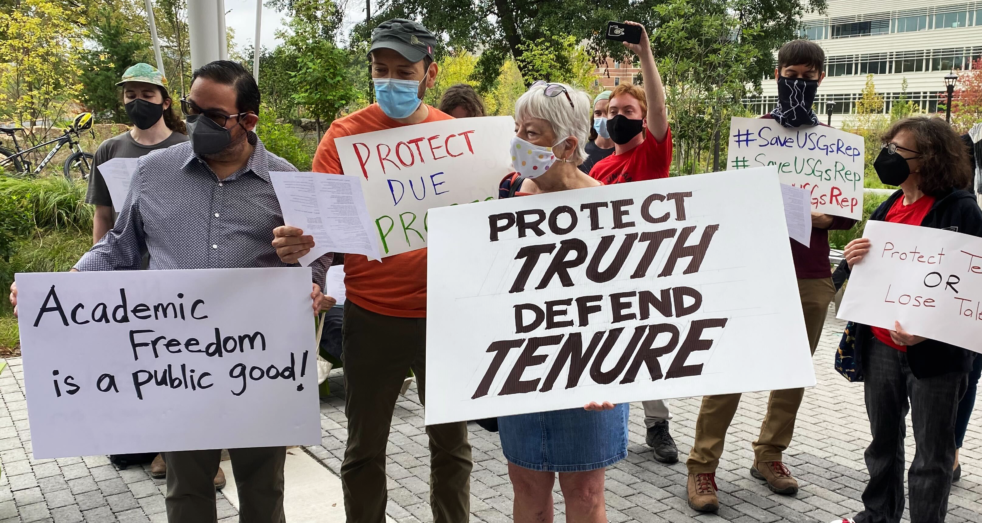The University System of Georgia’s (USG) Board of Regents unanimously voted this week to implement new changes to the tenure peer review process for USG professors. While touted by USG as a way to ensure tenured professors are actively contributing to their universities or not, critics say that this new policy is intended to erode traditional tenure policies and make it easier for USG members to fire tenured professors.
These changes have long been in the making by the USG, but pushback reached a peak Tuesday, Oct. 12, when representatives from the United Campus Workers of Georgia, (UCWGA) and professors from USG schools around the metro Atlanta area gathered around the Kendeda building to protest the Board of Regents vote.
The protest was backed by the American Association of University Professors (AAUP), whose national chapter has taken a strong stance against the push from USG and threatened to censure the USG, citing USG’s intent to “destroy protections for academic freedom, which [are] indispensable for the quality of teaching and research in higher education,” as the motivating factor.
The vote has also garnered attention from the political world as many democratic lawmakers have called it out as an attempt to censure the academic for the purpose of scoring political clout amongst voters.
Stacey Abrams, a former democratic nominee for the state of Georgia’s governor’s race, also condemned the new policy.
“Academic freedom guaranteed by tenure is more than a hiring gimmick,” Abrams tweeted.
“Georgia cannot compete for talent or produce innovation if we undermine our public [USG] has already abandoned the physical health of our schools. Let’s not destroy intellectual capacity as well.”
Much of the controversy around the change to tenure began when USG first released their proposal earlier this year. The initial language stated that USG tenured faculty could be fired “without cause,” causing an outrage amongst university faculty and staff around the state. USG later clarified the language, removing the original language and replacing it with the current wording stating that tenured faculty who fail to improve after a negative post-tenure review can be dismissed by administrators. However, many staff and administrators are still skeptical of the law, despite the reassurances and explanations of USG.
“They did remove the fired without cause language,” said Georgia American Association of University Professors President Matthew Boedy, an associate professor of rhetoric and composition at the University of North Georgia. He also added, “to me they’re implicitly adding a cause for firing, which is failed an improvement plan. But they’re not going through the fired for cause policy.”
Boedy went on to explain that by providing the opportunity to circumvent the peer committee, the change would mean, “the death of tenure.”
While many academic officials have continued to speak out against USG’s changes to the tenure system, the Board of Regents has continued to defend their decision, arguing that being fired from a tenured position is not something that is new. “It has always been the case that tenured faculty can be dismissed for cause, such as malfeasance,” wrote Lance Wallace, associate vice chancellor of communications for USG.
“That is a necessarily separate employee action distinct from post-tenure review and must be governed by a separate and distinct policy. As has been stated repeatedly, the post-tenure review process is a structured, year-long series of steps involving faculty peers and institution leadership. The proposed update to that language is to include student success as a new criterion. It is unrelated to dismissal by cause.”
In response to the proposed changes to the system, a petition has begun circulating amongst USG professors with a multitude of demands, including removing all suggested revisions of the tenure system by the USG.
The petition has already received 1519 signatures as of 9:15 a.m., Oct. 12. With the proposed changes set to take effect in the coming months, some have accused the USG, whose members are appointed by the governor of the state of Georgia, as engaging in partisan politics, but Boedy has stated that he does not see it this way.
“They’re running the university system, they’re overseeing, they’re making policies,” Boedy said. “They’re very bad policies and will ruin the reputation of the University System, but it’s not nakedly political.”
Many have taken opposing sides on the issue, but one they can all agree on is that the tenure system has begun to change systemically once again, for better or for worse.
